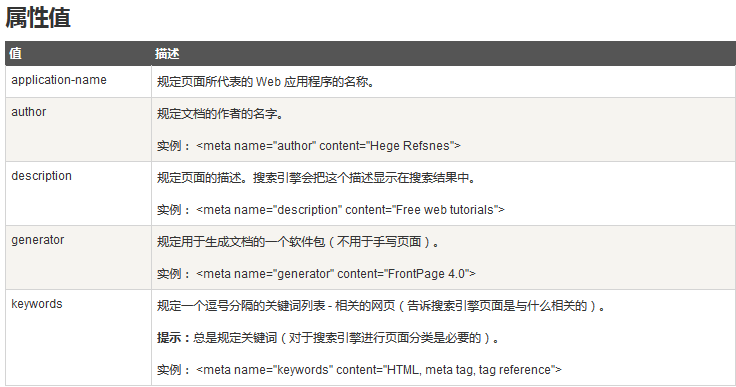
一、页面关键字
网站关键字:用户通过搜索引擎能搜到该网站的词汇。最好控制在10个以内。
基本语法:
<meta name="keywords" content="具体的关键字">
二、页面描述
基本语法:
<meta name="description" content="具体的页面描述">
三、设定作者信息
设定网站作者的名称,语法:
<meta name="author" content="作者信息">
四、限制搜索方式
robots用于定义网页搜索引擎索引方式,搜索引擎的定期搜索方式就是每隔一段时间,搜索引擎主动对一定IP地址内的网站进行检索,一旦发现新的网站就 自动提取网站信息加入自己的数据库,搜索引擎的搜索机器人会沿着网页上的链接不断地检索资料建立自己的数据库。如何限制自己的网站不被检索到?
有关http-equiv:
五、网页语言文字
基本语法一:
<meta http-equiv="content-language" content="zh-CN"/>
content-language为http-equiv属性值,用以标记页面语言,content取值为语言代码,格式为“语言代码-国家代码”,“zh-CN”表示中文-中国。
基本语法二:
<meta http-equiv="content-type" content="text/html;charset=gb2312"/>
content-type用于定义文件的类型和网页的编码。常见编码类型有ASCII, ISO8859-1, GB2312, GBK, UTF-8, UTF-16等。
六、定时跳转页面
基本语法:
<meta http-equiv="refresh" content="10;url=http://www.cnblogs.com/csxiaoyu/"/>
refresh用于刷新与跳转页面,content属性记录多少秒后跳转和跳转的网址。
也可以刷新本页面,如5秒后刷新本页面:
<meta http-equiv="refresh" content="5"/>
七、设定网页缓存过期时间
基本语法:
<meta http-equiv="expires" content="Sunday 20 October 2017 12:00 GMT"/>
时间必须使用GMT格式,content设置具体的时间值。
八、删除过期的cookie
如果网页过期,那么删除存盘的cookie:
<meta http-equiv="set-cookie" content="cookievalue=xxx; expires=Sunday 20 October 2017 12:00 GMT;path="/>
九、设置网页过渡效果
当用户进入或离开网页时呈现的不同效果。
基本语法:
<meta http-equiv="page-enter" content="revealtrans(duration=5,transtion=1)"/>
<meta http-equiv="page-exit" content="revealtrans(duration=5,transtion=1)"/>
page-enter表示进入页面时启用特效,page-exit表示离开页面启用特效,duration表示持续时间,transition是滤镜类型,表示想用哪种特效,取值0到23.



 浙公网安备 33010602011771号
浙公网安备 33010602011771号